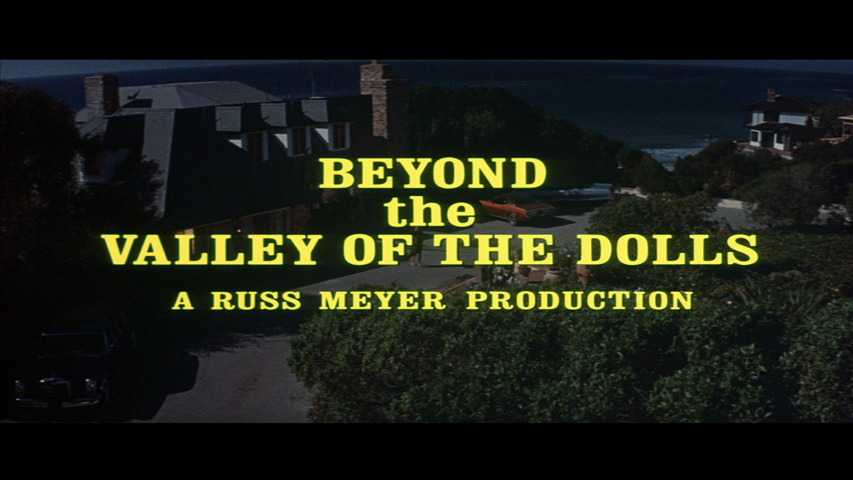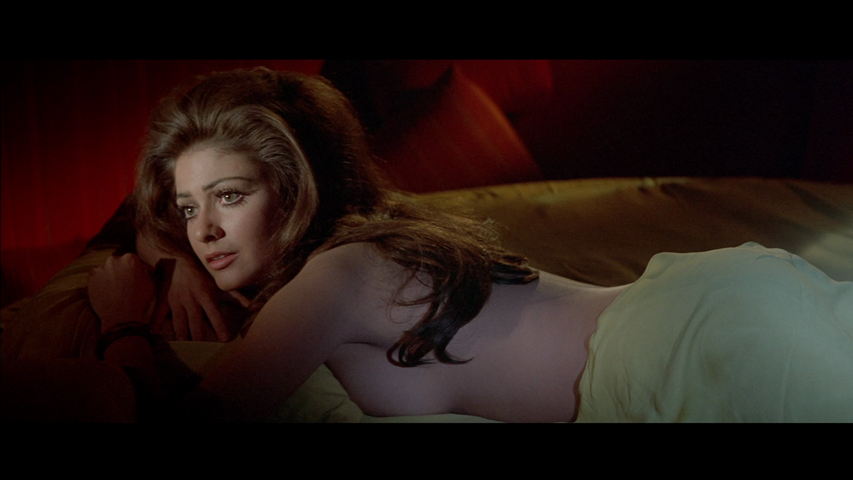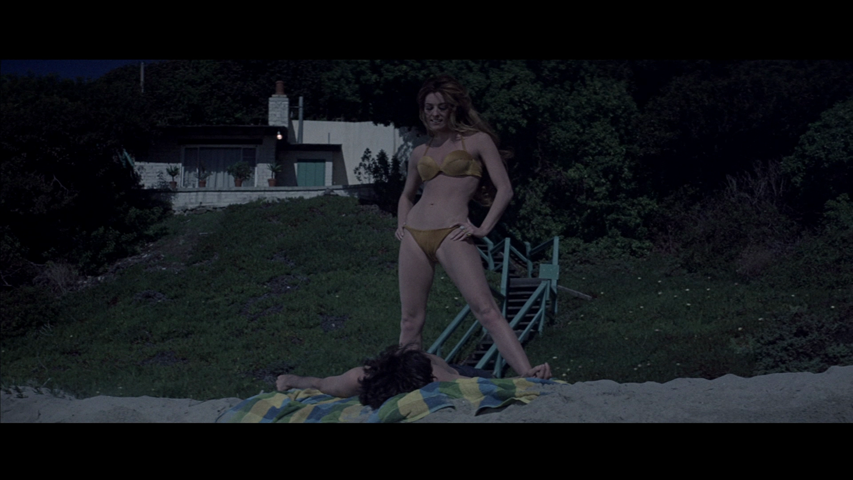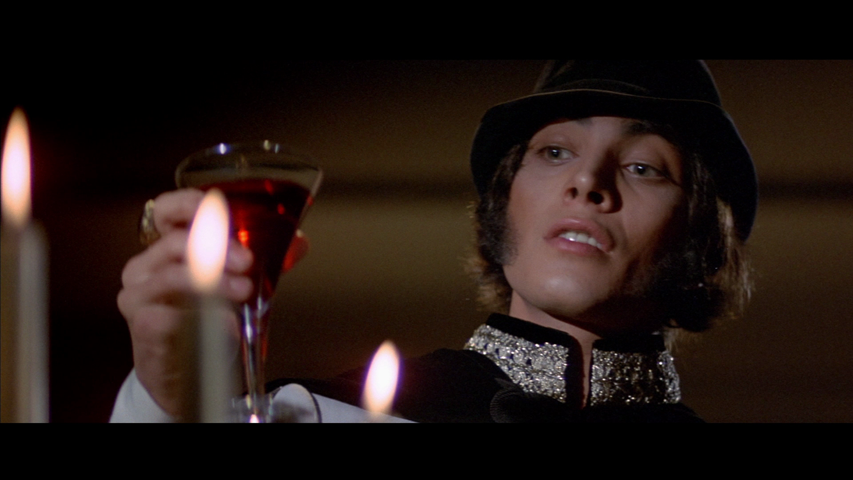| Reviews & Columns |
|
Reviews DVD TV on DVD Blu-ray 4K UHD International DVDs In Theaters Reviews by Studio Video Games Features Collector Series DVDs Easter Egg Database Interviews DVD Talk Radio Feature Articles Columns Anime Talk DVD Savant Horror DVDs The M.O.D. Squad Art House HD Talk Silent DVD
|
DVD Talk Forum |
|
|
| Resources |
|
DVD Price Search Customer Service #'s RCE Info Links |
|
Columns
|
|
|
Beyond the Valley of the Dolls
Russ Meyer and Roger Ebert's crazy, sexy soap opera

Loves: Weird movies, the Russ Meyer woman, that ‘60s look, John Waters
Likes: Roger Ebert, Russ Meyer
Dislikes:
Hates:
The Movie
Valley of the Dolls gets a lot of recognition as a cult classic, with a devoted fan base that luxuriates in how terrible the film is, but when you watch it, the big problem is, it's not only poorly made, it's also deathly boring. Boring is one term you absolutely cannot use when it comes to Russ Meyer' Beyond the Valley of the Dolls, which stresses, right at the beginning of the film, that it is not a sequel to the first film, but a film touching on similar topics. This disclaimer was hardly necessary. The differences between the two films couldn't be more stark, as Beyond, directed by noted nudie-film auteur Meyers and written by a 27-year-old Roger Ebert, is vivacious and manic--a delightfully strange vision of the destructive path of fame.
The core story involves Kelly (Playboy Playmate Dolly Read) and her bandmates Pet (Marcia McBroom) and Casey (Cynthia Myers, also of Playboy), members of The Kelly Affair, a three-piece girl group managed by affable Harris (David Gurian), who is also in a relationship with Kelly. Their lives change when a visit to Kelly's aunt Susan leads them to attend a swinging party thrown by Z-man (John LaZar), a pansexual imp of a music producer, who immediately takes the reins, rechristens the group as The Carrie Nations and sends them hurtling toward superstardom. And that's when their troubles begin, as they become ensnared in a world of sex, drugs and money that threatens to tear them apart.
The film is little more than a series of episodes involving the girls (and guys) and their various sexual partners. The plot is more of a way to get from coupling to coupling than a legitimately interesting story, and thinking about it, it's hard to remember if there's ever a resolution. There's certainly an ending--an insane, transfixing sequence that pays off in the film's starting promise of depicting "the oft-times nightmare world of show business"--but to say that there's a direct-line connection from the start to the finish (outside of Meyer's clever construction of the two elements) would be insincere. This film's slogan should be the era's catchphrase "be here now", as nothing is ever as important as what's happening on the screen at the moment.

As for the guys, things aren't as good. Gurian is pretty much a sad-sack, whose presence mainly serves to help delineate between Kelly's two worlds and be the subject of much pitying, while Harrison Page, playing law student Emerson, gets a rather progressive role as the only truly together person in the movie (though he also gets pit against heavyweight boxer Randy Black [James Iglehart] for Pet's love.) Michael Blodgett, portraying an arrogant con-man with very clear motivation, is much more of a presence, but this film belongs as much to LaZar as it does any of the women it heaps the spotlight onto. Playing his role to the hilt and then 10 levels higher, LaZar slings Shakespeare-esque lines with gusto and is magnetic in every scene, no doubtly aided by his almost alien looks, with an angular face and high cheekbones that recalls an in-his-prime Mick Jagger, mixed with the androgyny of David Bowie. (As the film dabbles in lesbianism, it also introduces some gay notes as well, but these are more vilified than embraced, with the movie firmly coming down on the side of heteronormativity.) By the time LaZar delivers his signature line, "This is my happening and it freaks me out!", there is no doubt that he is the star of the show, and he will confirm that in the final sequence, selling moments that should, by all rights, be truly terrible cinema, but instead are a true pleasure.
Speaking of pleasure, Beyond the Valley of the Dolls is heavy with some terrific music, with The Carrie Nations playing (or rather lipsyncing to) a number of extremely catchy songs, including "In the Long Run", "Look Up at the Bottom", "Sweet Talkin' Candy Man" and "Find It", written by Stu Phillips (with Bob Stone) and sung by Lynn Carey (who co-wrote "Find It".) These songs are easily as successful on their own as the music of Stillwater from Almost Famous and could be dropped into a ‘60s radio playlist without notice. Strawberry Alarm Clock, the ‘60s band best-known for the song "Incense and Peppermints", also appears in the movie, as themselves, offering proof that they were more than just their biggest hit, playing the rocking "I'm Coming Home".
For as much as Myers is known for the beauties he put in front of his camera, he also was an artist with the camera. His movies are technical works of art, even if his camera work was purposefully limited, with little to no movement. Instead, his compositions are precise, his production design is detailed and his editing, though rapid-fire (some scenes are a blur of quick cuts), is purposeful, instilling energy into the film as needed and covering up the limitations of his cast. Sure, some of the moments look low-budget (like anything involving any kind of effect) and the film's perspective of the counterculture is definitely from the outside looking in, but overall, the film is a technicolor dream, the kind of candy-colored confection that you don't see much of anymore. (If only Meyer had been allowed to make an episode of the ‘60s Batman TV series.)

The Disc
Beyond the Valley of the Dolls (spine number 836) arrives on one Blu-ray disc in a clear keepcase with a double-sided cover featuring appropriate comic-style cover art by Jim Rugg. The classic Criterion menu, over video of The Carrie Nations, gives the choice to watch the film, navigate the timeline, select scenes and check out the special features. There are no audio options but English SDH subtitles are available.
The Quality
The 1080p, AVC-encoded 2.37:1 transfer comes from a new 35mm interpositive made from a 35mm negative, with some clean-up on the part of Criterion. The results are stunning, mainly in terms of the color and the fine detail, both of which are beautifully rendered, making the film look decades newer than it actually is. Black levels are good (there's some very pleasing silhouettes that works quite well) and the grain layer is consistent, though some of the darker scenes look a touch noisy. There are no issues with digital distractions, but a select few specks of dirt were surprisingly evident, even if, overall, the image is crisp and clean.
The audio's LPCM 1.0 track is notable for the presentation of the film's music, which sounds great for a one-channel delivery. Dialogue is easily understood, even during some of the more cacophonous scenes, and there are no issues with distortion or hiss. Solid all around.
The Extras
Most of the extras from Fox's packed 2006 DVD release have been carried over here (as they were for Arrow's limited-edition release from earlier this year), with the exception of LaZar's introduction. The ones that did make it include a pair of feature-length audio commentaries, one from Ebert (which was actually recorded by Criterion for an earlier aborted release) and one from a quintet of the film's actors: Read, Myers, Page, LaZar and Gavin. If you've heard an Ebert track before, you know what to expect, which is a ton of detailed trivia and insightful analysis of the film, but in this case there's also the personal angle he can add as the film's writer. He covers topics like how he got involved with Meyer and the techniques used to make the film, with plenty of on-set info, as well as the influence of silent films and the hallmarks of Meyer's works.
The cast track, which was recorded with two separate groups chatting remotely, is more of a reunion recording, as the group laughs and jokes about what's happening on-screen, reminding each other of stories of the production and often getting a bit dirty (as with one argument over whether a moment is supposed to represent premature ejactulation or impotency.) Aside from LaZar's brutally bad jokes, the track is a good time, letting you listen in on some old friends having a blast reminiscing.
Fox created an impressive selection of featurettes for their DVD, featuring (in various combinations) the entire main cast, as well as a variety of fans and crew. "Above, Beneath and Beyond the Valley: The Making of a Musical-Horror-Sex-Comedy" (30:01) is a rather wide-ranging retrospective on the film, done in an amusing hand-made style, touching on Meyer's style, the basis for the characters and the film's legacy, with interviews featuring Meyer's assistant, biographer and cinematographer; critic David Ansen; columnist Michael Musto and much of the cast.
"Look on Up at the Bottom" (10:58) focuses on the film's music, bringing in Phillips, Carey and Strawberry Alarm Clock's Paul Marshall to discuss their role in this important factor, as well as Jeff McDonald and Steven McDonald of Redd Kross, director Dave Markey (the similarly-themed Desperate Teenage Lovedolls) and Pansy Division's Christopher Freeman to discuss their fandom of the music. For fans, there's a lot of good info here, including the differences between the film's music and the album that was released and the effort made to fake the music for the film.
"Sex, Drugs, Music & Murder: Signs of the Time, Baby!" (7:34), which adds The Onion's Nathan Rabin and history professor Mary Corey to the party, is less about the film and more about the time in which is was made, as the atmosphere surrounding the production is discussed and what that meant for the film, including the Charles Manson murders, which, in a way, inform this film. For those who weren't around, this brings solid context to the film, which is definitely a product of its time.
"The Best of Beyond" (12:21) is a silly piece, bringing in Pulp Fiction music consultant Chuck Kelley and artist Coop, as the participants pick out their favorite bits of the movie, for categories like Best Line, Best Breasts, Best Kiss and Best Head, but they aren't exactly pretending they are saving the world. It's fun, light and airy, just like "Casey & Roxanne: The Love Scene" (4:19), where Myers and Gavin get to look back and their lesbian tryst in the film. Of them all, this is the least informative, but it's certain to have its fans.
Also carried over are 7:29 of screentests, in which Blodgett and Myers and McBroom and Page read for the same characters. Aside from seeing McBroom and Page play alternate characters, it's of limited value.
The Arrow release (which is no longer available following a 3000-copy print run) had a few extras not found here, on a separate DVD, including Meyer's film The Seven Minutes, the movie's trailer and a 1987 interview with Meyer and Yvette Vickers. Criterion, however, adds a few extras not found on either the Arrow Blu-ray or Fox's DVD, starting with "Beyond the Beyond", a new 29:43 interview with John Waters, which could have been a few hours longer, as the filmmaker expresses his appreciation for Beyond, talking about his own experience with Meyer and his films, discussing the history of "nudie cuties" and offering insight on the film and the actors in it, including the depiction of transgender and lesbian characters and the time period in which it was made. With his charm and perspective, Waters should be a feature on every Criterion release. It would be appreciated.
Criterion also ported in a several archival elements. Severin Films is behind 2005's "Memories of Russ" (8:16), in which Napier, Page, Gavin, Haji and Meyer's friend Jim Ryan remember the filmmaker (and manage to not duplicate too much of the previous content.) This doesn't seem to have been released previously, which makes one wonder why Severin made it.
An episode of Jonathan Ross' ‘90s TV series The Incredibly Strange Film Show (38:19 ) focuses on Meyer's career, breaking it down film by film, with plenty of clips and a core interview with the man himself (as well as some notes from Ebert.) Two takeaways: one, does anyone have The Breast of Russ Meyer, Meyer's personal compilation which Ross is shown a clip of in the episode, and two, who is going to release DVDs of the complete run of The Incredibly Strange Film Show, which based on this entry and the list of episodes, seems like a must-watch for film fans.
Wrapping up the archival additions is a 1990 Q&A hosted by the L.A. Film Critics Society at UCLA's Film and Television Archive, featuring Meyer, Ebert, LaZar, Gurian, Read, Napier, Blodgett, Williams and Haji (though she's not listed in the description.) Running 42:20, this is dark, lo-fi home video and the audio is pretty hard to make out at times, but they talk about what their lives were like at the time of the film's production and Ebert mentions a Criterion release for the film (which would have been a laserdisc at the time.) It's mostly however a lovefest for Meyer, as his cast and collaborators praise him.
There are a handful of trailers available, including the blink-and-you'll-miss-it 12-second teaser (made up of flashed stills from the film); the 2:13 montage of a theatrical trailer, which features "hip" commentary that's just ridiculous; and a 2:02 behind-the-scenes trailer, which includes some making-of footage with the cast and Meyer. As a nice bonus, there are also trailers for Meyer's Faster, Pussycat! Kill! Kill! (2:45) and Vixen (1:24), which are fun in that precisely Meyer way.
The traditional Criterion booklet included checks in at 36 pages, with info about the movie and disc, a pile of great behind-the-scenes photography, an insightful essay on the film in the context of its era from writer Glenn Kenny, and an article by Stan Berkowitz from a 1970 issue of the UCLA school newspaper, on a visit to the set of the film.

The Bottom Line
Beyond the Valley of the Dolls is without argument the better of the two "Dolls" movies, a very ‘60s film that's alive in a way few films are, instilled with Meyer's love of women and an uninformed view of the culture of the time, which combine to make something bizarre and enjoyable. The presentation is top-notch and the wealth of extras, combining a lot of archival material and a splash of new content, make it a wonderful package for those new to the film and long-time fans.
Francis Rizzo III is a native Long Islander, where he works in academia. In his spare time, he enjoys watching hockey, writing and spending time with his wife, daughter and puppy.Follow him on Twitter
*The Reviewer's Bias section is an attempt to help readers use the review to its best effect. By knowing where the reviewer's biases lie on the film's subject matter, one can read the review with the right mindset.
|
| Popular Reviews |
| Sponsored Links |
|
|
| Sponsored Links |
|
|
| Release List | Reviews | Shop | Newsletter | Forum | DVD Giveaways | Blu-Ray | Advertise |
|
Copyright 2024 DVDTalk.com All Rights Reserved. Legal Info, Privacy Policy, Terms of Use,
Manage Preferences,
Your Privacy Choices | |||||||













